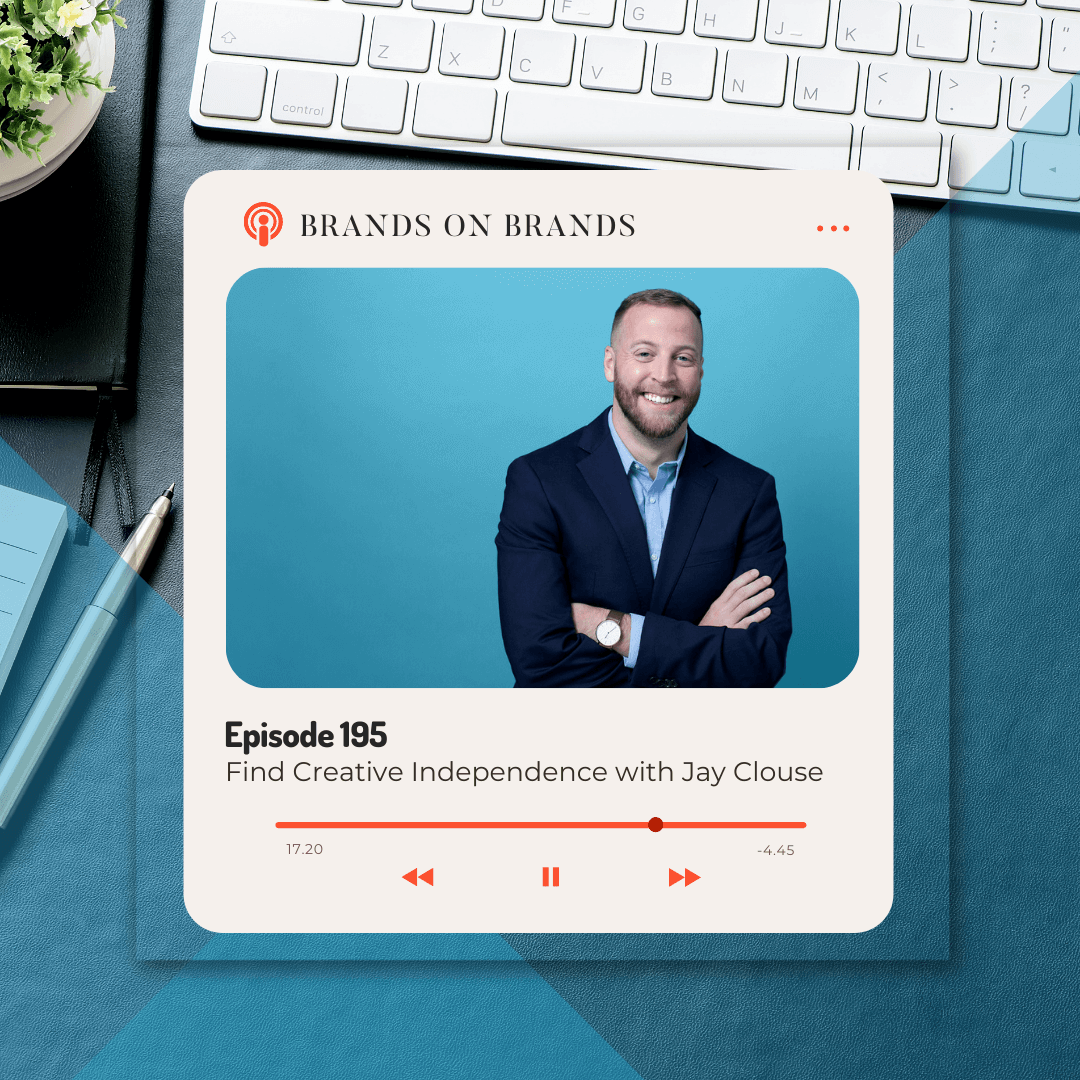In this week’s episode, I get to talk about creative independence with Jay Clouse.
Jay is the creator of Freelancing School, which provides the training and community to help people make a living freelancing. With three courses, coaching, and community support, Freelancing School has the tools to help creatives thrive as business owners.
He is also the founder of Unreal Collective, a community for founders, freelancers, and creators.
FIRST STEP TO CREATIVE INDEPENDENCE
Brandon Birkmeyer: You’ve coached a lot of people on becoming creative for themselves. I’d love to tackle what you’ve seen as some of the first things that people tend to need to knock over to get there, that you’ve helped people through.
Jay Clouse: There’s this great book called “The Artist’s Way” by Julia Cameron. She has this phrase called “shadow artist”, which is this idea that you have this urge. You see other people doing the thing that you want to do, and you identify with that life that you’re seeing or projecting on them, and you want that in.
We see so much of this openly now on social media and the internet. It’s easy for us to conclude some of the things that we need to do to get there. While it seems intuitive, it can also feel overwhelming. Where I see a lot of people struggle is they just don’t get started.
They don’t start doing something because it’s going to be bad and it’s going to be wrong and you’re going to be embarrassed by it. You’re going to want to start over and you’re going to change things.
YOU WON’T BE PERFECT RIGHT AWAY
That’s going to happen no matter how much forethought you put into it. You’re never going to go to market with something perfect the first time. The best thing you can do is start to get experience and get some reps.
If you want to be a writer, don’t worry about getting a logo. Don’t worry about building a website. What is the shortest distance to writing? It could be a notebook, it could be a notion document, it could be medium.com.
There are so many tools that will allow you to start getting reps because you need to do that to recognize the things that you actually like. We have assumptions, but you have to actually do the act of whatever to really figure out, what parts of this do I really like and not like so that I can shape my effort in a way where I remove the things that I don’t like?
CREATIVE INDEPENDENCE IS A JOURNEY
Brandon Birkmeyer: How did you get some of those reps? You’ve done a lot, but if you think back to you starting on this journey trying to make those reps, what kind of challenges did you run into along the way that you could maybe save us from, or not?
Jay Clouse: My first blog was in high school; it was a Xanga blog. That built some muscle. I wrote a thing and I put it on a website that somebody else owned. I knew there was a short distance there.
In college, I was convinced that would be a comedian, and so I started WordPress and I started writing on there. Again, I’m writing online, but at least on WordPress, I set it up for myself.

Then as I went into my career, I was a product manager and I was in startups. We had some success there. I started to link my identity to startups and the sale of that startup. I got away from making stuff. When I realized that, it was a blocker, something that was deeply upsetting me.
BELIEVE IN YOUR CREATIVE ABILITY
I worked with a coach and he helped me identify I had this narrative I was telling him, that I thought I wasn’t creative, that I thought I was a really great operator. I could take ideas and I could make them real. That was like a big hang-up for me.
It made me sad because I had this shadow artist’s career where I would see people making stuff. I would think, damn, that is so cool. That is so cool that you’re doing your own thing.
When I recognized that limiting belief, the first thing that I did was say, “Okay, well, how do I flip that on its head?” To me, that was writing every day for a year and publishing it publicly.
I started a MailChimp account. I might’ve actually already had a MailChimp account, but I was using it super irregularly, so I thought, all right, I’m in MailChimp. I’m going to send out something every single day.
I did that and that was great, that was exhausting, and a lot of it was trash. Now it’s actually actively hurting the SEO of my website, but I can remove those things, and I went down to weekly. I now know that I have this muscle where if I want to create something and I have a deadline, I will hit it and I will do it and I can do it. People appreciate it.
Now, instead of just getting reps and doing this because I can, it became more of a, “What do I want to do? And how do I start building that?”
CONSISTENCY IS KEY
It’s building confidence and building this belief in yourself that when I say I’m going to do a thing, I do it because the opposite is true also. If you tell yourself or other people that you’re going to do a thing, and then you don’t do it, you begin to build distrust with yourself, like your word doesn’t mean anything to you.

You need to build the muscle where what you promise to yourself and to others comes through. If you’re in a state right now where you’ve failed so many promises to yourself that you no longer even take yourself seriously, you need to explicitly have a conversation with yourself, as crazy as it seems.
Wipe the slate clean and say, “Okay, starting on this date, things are going to be different.” Then you need to follow through (and then follow through and follow through,) and you start to change your own perception.
RELATED: Build your personal brand with the Content Marketing Starter Guide.
BE DEDICATED TO YOUR CREATIVE INDEPENDENCE
Brandon Birkmeyer: Did you struggle to keep those promises? You have a podcast that comes out very consistently. You had that blog that you were writing for each day in a row. Have you thought, “I may not get this episode out today? I may not get this blog out, even though I promised myself for a year?”
Jay Clouse: It’s definitely not easy, but I never doubt that it will happen. The question is, how painful will it be to get to the finish line and what will the state of the final product be when I get there? It’s never a question of, “Am I going to do the thing?”
I have made a sacred covenant with myself and I’m going to do the thing. I thought it came from my time in journalism in college, because in journalism when you’re writing for a literal newspaper that goes to print on a certain time every day, if you didn’t have your work done, you couldn’t print it.
MAKE YOUR DEADLINES NON-NEGOTIABLE
However, the paper was going to print anyway. The paper prints every day. If your stuff wasn’t done, it wasn’t going into the paper. Now there’s a big hole, which makes your editor pissed off. It’s a big problem. Deadlines were just non-negotiable in journalism.
I had built this muscle with myself when I had a deadline, I hit it because I had to. The consequences were too hard, too high, not to.

I just carried that over into this world of creating content. I wish I could just bottle that up and give that to people because I recognize it’s a problem for so many people. However, in my mind, the stakes are just really high, and not publishing on the deadline is not an option.
DEDICATION BECOMES EASIER WITH TIME
Brandon Birkmeyer: It seems like it forces you into some skill development. After having to keep that promise to yourself every time, you then have to say, “How am I going to do this? How am I going to create new content ideas every week? How am I going to edit this in a way that it’s not murdering my time every week?”
Along the way, it gets easier, I’d imagine because you’ve been doing it for so long.
Jay Clouse: Yeah. I had a friend of mine who was telling me about his little brother. His little brother was about to start his third job in one year. I know his little brother, and he has this entrepreneurial itch.
If you have an itch, whether it’s entrepreneurial or just creative and you don’t know how to scratch it, it is agonizing because it won’t go away. Then you need to have an answer for, “How do I calm this?”
Having these routines and rituals where every week I’m publishing a newsletter on Sunday, every week, I’m publishing the podcast on Tuesday, that removes so much existential questioning of, “What should I do?”
CREATIVE INDEPENDENCE MEANS YOU KNOW WHAT TO DO
You no longer have to ask, “Should I create a thing? What do I create? When do I create it?” All that’s done. I just have to make the thing. By making that and having that practice on a weekly basis, that pretty much ensures that I’m going to get some percentage better every week that passes.
However, if you don’t have that routine or that ritual in place, then you just have this constant battle with yourself and your lizard brain of, “Am I going to make a thing? What should that thing be? When will it be due?”
If you don’t set a deadline at all, and you don’t know what you’re making or how you’re making it, nothing happens and you live in a state of frustration.
CONNECT WITH JAY
MORE ADVICE AND INTERVIEWS
Free Guide: Convert 1 Hour into 1 Month of Content
If you’d like more content about how to build your personal brand, check out my free Content Marketing Starter Guide.
And here are some more of my most popular thought leader interviews!
- What Business to Start with John Lee Dumas
- Personal Branding Masterclass with Chris Ducker
- Built to Serve with Evan Carmichael
Don’t want to miss the next thought leader interview? Subscribe to the free B-team Insider Newsletter! And don’t forget to leave a rating and review on iTunes.
Talk soon!
